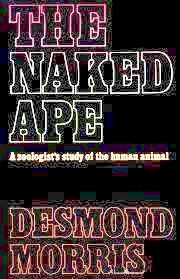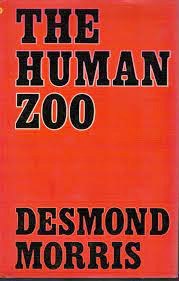Selected Reviews by Subject:- Film, TV, DVDs, CDs, media critics | Health, Medical | Jews (Frauds, Freemasons, Religions, Rules, Wars) | Race | Revisionism | Women | Bertrand Russell | Richard Dawkins | Martin Gardner | H G Wells


Looking online, there are uncontroversial recent Youtube![]()
![]() videos of Morris in elderly, raconteur mode, plus a separate written biography by David Williams. His own account starts with the Second World War, which he hated for its stupidity—his mother kept one of his essays on the subject. This put him off mankind (with some exemption for girls) but led him to zoology. He seems to have had little inclination or time for technical biology; H G Wells's Science of Life appeared when he was an infant. At about the same age as David Attenborough, part of the post-1945 BBC propaganda management, Morris was in the British Army for a couple of years, but his rank, and activities, are not disclosed by him. This seems to have made little impression; the mechanics of why people obey orders they don't understand being a likely topic for zoologists. Remember that 'Solly' Zuckerberg ran London Zoo. Anyway, he got a degree from Birmingham in zoology.
videos of Morris in elderly, raconteur mode, plus a separate written biography by David Williams. His own account starts with the Second World War, which he hated for its stupidity—his mother kept one of his essays on the subject. This put him off mankind (with some exemption for girls) but led him to zoology. He seems to have had little inclination or time for technical biology; H G Wells's Science of Life appeared when he was an infant. At about the same age as David Attenborough, part of the post-1945 BBC propaganda management, Morris was in the British Army for a couple of years, but his rank, and activities, are not disclosed by him. This seems to have made little impression; the mechanics of why people obey orders they don't understand being a likely topic for zoologists. Remember that 'Solly' Zuckerberg ran London Zoo. Anyway, he got a degree from Birmingham in zoology.
He had the luck to work with Tinbergen and Lorenz and others at Oxford. Tinbergen explained what an 'ethogram' was: a chart of possible motions of a creature (it occurs to me that Google's ngram is a vague analogy, with word frequencies over time). He studied the stickleback (a small fish) and the title of his D. Phil. dissertation had the same subdivisions—Origins, Sex, Rearing, Exploration, Fighting, Feeding, Comfort, and Animals—as The Naked Ape. Which is said to have been a big seller, though figures are never given.
During relaxation/ tax saving/ holiday/ wondering what to do next in Malta, he considered the monstrous size of cities and wrote The Human Zoo, the title a riposte to the ‘Concrete Jungle’ wrong idea. He had a double life as a painter, with considerable output, favouring surrealism—in my unfairly speedy review, resembling the landscape scenes of Dalì, without the visual puns, and unlike the visual mismatches of Magritte and the huge suns of Ernst and Breton's precisian drawing. He even produced some films, which I think were short; perhaps modelled on Buñuel. This aspect of his life seems to be under-reported, probably because art galleries are localised while spectators aren't, and good quality reproductions are expensive and may have copyright issues.
In Malta, he says another period (the longest - fifty years) of his life began when, at his café table, he tried to communicate with the newsagent on the other side of a busy road, and received a mysterious head movement. Most of his trips to large numbers of countries, a gift from white engineers, seem to have been to watch people's short-term movements. I couldn't find that he managed to fit in observations of (for example) long dances. He regards himself as a 'watcher'.
Manwatching (1977; TV film 1994) had description of such things as the 'precision' gesture, the 'handwash' signal for pleasant expectation, the 'beseech' gesture, the 'cornuto', and so on. And of course gestures meaningful here but not there, or impolite in some places. I'm reminded of a crit of Wittgenstein—the trivia of anyone (in effect) reasonably multi-talented.

He says in an interview that he hated war, which raged during his early teens, and turned to animals. This convinced me he was uninfluenced by Jews, all of whom loved the War—it was a tremendous opportunity for staying out of battles, while running schemes from food cornering and prostitution to moving Jews into houses where males were away dying. Tens of millions of 'goyim' were killed, so what was there not to like?
Another revealing fact is that his small section on religion emphasises postural abasement of 'worshippers'; Morris seems to have no idea about the Kahal tribal system and primitive 'rabbis' in other people's cities.

As with many people of the time and before, it's exasperating to see Morris's energies somewhat sterilised and diverted.
The Naked Ape was followed by The Human Zoo (Jonathan Cape, 1969) and Intimate Behaviour (Jonathan Cape, 1971). (Details and page numbers apply to first impressions in Britain; other countries and translations and editions may differ).
[Worth noting that Hans Hass wrote Wir Menschen: Das Geheimnis unserres Verhalten, published in 1968, & translated in 1970 into English as The Human Animal which looks like another publisher trying for the bandwagon. I have a paperback copy, but its small format makes for difficult reading. It does seem detailed, with many references (more than Morris) and appears to prefigure much of Morris on gestures. Hass used movie film technology quite freely. The exact English title was used later on TV, but whether there was some copyright arrangement I don't know.]

The book (my copy is an eighth impression, 1968; number of copies printed, not revealed. Attractive thick paper and largish print. Jonathan Cape colophon. Thirty, Bedford Square, London. For my taste a not very attractive green spine colour.
The book is unindexed, unfortunately. It has eight principal chapters, none with subdivisions: ORIGINS | SEX [This looks to me his sample chapter.] | REARING | EXPLORATION | FIGHTING | FEEDING | COMFORT | ANIMALS so that anything vaguely remembered is hard to relocate. Good indexing is rare, since the indexer has to understand the book to rise above simple names and nouns.
Endnotes for each chapter list principal books, typically about ten, though ORIGINS has far more, the earliest dated 1925. Rather obviously, these works are all dated 1967 at the latest. To the modern eye, most also date from the Jewish victory in the world wars. In the SEX chapter, there's nothing early to perturb the stroll through openly-discussed sex and intercourse. There's also a bibliography of about 80 titles, which of course excludes Dawkins and Alex Comfort's Joy of Sex. It includes A C Hardy on the aquatic ape hypothesis, and J H Fremlin on How Many People Can the World Support, about 3 pages from the New Scientist, which turns out to be a heavily-censored junk science magazine. There's nothing on the then-current Bertrand Russell enquiry into Vietnam—most of these references are on child development, animals, some of the 192 other apes, man the toolmaker and so on. Ehrlich's Population Bomb was published just after The Naked Ape.
In my case, I recalled that Morris, years ago, mentioned the origin of laughter in babies as a 'magical act'. So I picked up my copy and looked for it, finding it in REARING (what Americans call RAISING).
[p 117] Seems based on a PhD dissertation by J A Ambrose (1960 The Smiling Response in early human infancy. '.. to put it another way:
'There may appear to be danger, but because it is coming from me [your mother]you do not need to take it seriously'. The outcome of this is that the child gives a response that is half a crying reaction and half a parental-recognition gurgle. This magic combination produces a laugh. ...' (I was trying to work out why someone in Facebook typed LOL ('laughing out loud') to a comment of mine on E Michael Jones.)
Here's another extract on actors and actresses, body-language liars, the importance of which Miles Mathis ascribed to Booth, the supposed assassin of Abraham Lincoln.
'Politicians and diplomats are also required to perform an undue amount of behavioural lying, but unlike the actors they are not socially 'licensed to lie'. Also, unlike the actors, they do not undergo prolonged training courses.' [p 171]
This extract [177-178] looks at world population. But Morris doesn't distinguish between population groups; it is now widely known that Jews want selective population drops of everyone except themselves. The outcome so far is a consequence of Jews arranging and winning World War 2: they arrange migration into white countries, and support blacks, aware of their inferiority and usefulness in masses. Morris relies on one article in a third-rate magazine by an author, J H Fremlin, who was utterly obscure. The best-known over-population book was Ehrlich's The Population Bomb published just after The Naked Ape.
'...A favourite solution is massive mutual disarmament ... Another solution is to de-patriotize the members of different social groups ... A third is ... symbolic substitutes for war. A fourth is ... intellectual control over aggression. ... since our intelligence got us into this mess, our intelligence ... must get us out.
The only sound biological solution ... is massive de-population, or a rapid spread ... on to other planets ..'
[179] says that all apes and monkeys '... in typical cases, each group is dominated by a single male. He is the boss, the overlord, and every member of the group has to appease him or suffer the consequences. He is also most active in protecting the group from outside hazards and in settling squabbles ... His all-powerful role gives him a god-like status. ...'
I think this smuggles in unconscious assumptions, which don't apply to human groups. Leaders aren't 'all-powerful', and 'God-like' is inserted Jewish nonsense. Information, knowledge, skill is missing. So is secrecy. The mis-presentation of the situation is useful to Jews and their submissives, since it draws attention away from counsellors, people with knowledge, record-keepers. It allows such people as Monarchs and Presidents and Party Leaders and Archbishops and Generals to be presented as bosses, when they are generally influenced and controlled by—it has transpired—Jews and their temporary confidantes.
All the extracts above (except the baby laughter one) are from the same chapter, FIGHTING, which gives some idea of the difficulty of finding remembered items in this book. Here's another from the same chapter:
[p 179] '... in a behavioural sense, religious activities consist of the coming together of large groups of people to perform repeated and prolonged submissive displays to appease a dominant individual. ... closing the eyes, lowering the head, clasping the hands together in a begging gesture, kneeling, kissing the ground, or even extreme prostration ...'
From a modern revisionist viewpoint, all this ignores Jewish pressures, in which Jewish 'religion' involves targetting 'goys' to be destroyed, setting up puppets at the nominal top of hierarchies, threats and menaces. A perfect example is President Wilson, discreetly surrounded by Jews, threatened with exposure of his adultery, made to sign the Federal Reserve Act for Jews, taking the USA into war, despite promising the opposite. War was of course wanted by Jews, something DM appears to be utterly unaware of.
As regards religion, Jews imposed astonishing nonsense: a whole litany from jubilees and hosannas and one single Jewish being called 'Jahveh' or variations, 'heaven', 'hell', 'angels', 'the Devil', an entire huge book on strategies ('Talmud') and another huge book for goyim, on violence and genocides—astonishingly success, and with an army of thugs destroying much of previous civilisation. And substituting a paid army of people, who, in exchange for a life inhabiting proprrty and carrying out simple tasks, assisted Jews in their activities! DM simple has no idea of any of this.
More people than at any time—I'd guess—have become aware of all this. Somewhere in Morris's books DM asserts that all races should be mixed together, a policy behind the Coudenhove-Kalergi scheme. It is truly astonishing that a biologist should recommend the rejection of all accumulated genetic characteristics. I haven't found where he says this, but I assure you it is in there somewhere.
It is curious to notice that Hitler's biological interpretations of history have a number of striking resemblances to those of Desmond Morris. In both writers one finds the same reliance on the analogy of the lower mammals, on a few basic formulas of behaviour such as 'struggle', 'competition', 'defence of territory'. There is the same simple schematic view of social relationships, the same highly generalised assertions about human behaviour that are presented as proven facts. Hitler talks without definition of 'lower races' in the same way that Morris refers to 'primitive societies' and 'simple communities'.
I suspect the book was popular with some women and men, who saw justification for treating babies and children with understanding and sympathety, in opposition to Watson, and adults in ways which are caricatured by the Jews controlling what they call 'adult' industries.
RW

1. Tribes and Super-tribes looks at early man, and DM believes in the last Ice Age and hunter-gatherers and the need for women to stay home to do everything except hunt. DM is vague as to whether they were nomadic or needed housebuilders. but some Biblical fixation: he notes [p 20] the first fully urban civilization in Sumer' was away from the 'breakthrough point ... at the eastern end of the Mediterranean' [p 15]' though without wondering what the distance might mean. It could that the destroyers hadn't yet got to work.
DM describes the 'blossoming' of tiny tribes into large super-tribes, noting the presumable inability of the resulting people to know each other. On p34 DM says 'Each [cohesive force] developed its specialized kind of leader: the administrator, the judge, the politician, the social leader, the high priest, the general'. DM though insists there were monarchs, lords, or whatever—just one. Whether this is true, I doubt, thinking huge societies need many people, and I'd expect these to make the decisions, while the nominal leader is more or less a puppet.
2. Status and Super-Status looks at hierarchies in baboons etc, an easy way to avoid discussion of decision-making, competence, secrecy of aims, and so on. DM draws parallels but goes wrong here: [p 52] 'Human leaders have increasingly extended the protection of the weak to also the old, the sick, and the disabled. ... efficient rulers ... need to defend the growing children ...' In fact, leaders in most countries now are subordinate to Jews, and carry out their policies. Robert Mugabe was one example.
3 Sex and Super-sex isn't about sex in huge conurbations, but 'multifunctional super-sex'. DM trying his hand at a big-selling writing style. DM finds ten categories, The first being procreative sex, where of course the state of populations is important, as is the genetic outcome (which DM seems to always ignore) such as families with appalling debilities. DM writes on pair-bonding and its effects; on physiology; sterile and sensorially deprived sex, displacement sex, commercial and performance sex, and dominance sex. My wording. All this doesn't seem to me of much relevance to action on huge populations.
4. In-Groups and Out-Groups I'd say the most interesting chapter, casting indirect light on DM's attitude to race DM is evasive on race (despite having nearly 200 apes to look at). DM assumes Homo Sapiens is one species, though he does state that this is the only surviving member of the family. I suspect his insistence on chimp 'art' evades the problem of intelligence, though he mentions a 'chimpsky' experiment. Philippe Rushton, a few decades later, said that hefty jaws able to cope with raw meat narrowed part of the brain; this sort of thing, despite frantic Jewish censorship, is likely to continue. And if the brain ever comes close to being understood, it's even more likely.
Desmond Morris preceded the media myth of 'Wakanda', but provided evidence that Negroes were gifted and capable. His example is an obscure explorer, possibly a Dutchman Olfert Dapper. I found exactly the same extract translated into English in Oyebola's Black Man's Dilemma (1976): '.. of all the centres of the so-called black African civilisations I had visited - Oyo, Benin, Sokoto, Maiduguri, Ife, the ancient cities of modern Ghana, etc., I found mud walls and dilapidated buildings not in any way comparable to the solid stones and concrete buildings - the great monuments I found in Europe, Asia and the Middle East. .. I have come to the conclusion that the Dutch who visited Benin City in Nigeria in the 15th Century ... were more interested in trade success and diplomatic deceit than in the reality of Africa. ...'
This was all the evidence provided by DM to support the idea that all signs of race should be removed!
Morris provides a handy table [p 136] of five 'sub-species' (races) with Caucasoid 1757, Mongoloid 1171, and Negroid 200 million. Totalling about 3 billion. He regards 'Negroid' as a successful species, having no interest in the methods by which they were boosted. Incidentally, DM has no awareness of Jewish control of black slavery.
His figures seem to have come from Fremlin's New Scientist article. I doubt DM had any grasp of the difficulties of getting accurate estimates; see e.g. Are world populations exaggerated? And DM makes no biomass estimates; perhaps the total mass of wild animals is far greater than the biomass of people. DM's list of sources for this chapter (near the end of the book) includes many Jews, who are known to swear to tell lies to non-Jews. One is Ashley Montagu, real name Israel Ehrenburg, part of the post-1945 push to submerge all information on race—including information about Jews and their attitudes.
5 IMPRINTING AND MAL-IMPRINTING is perhaps the next most interesting chapter, starting with experiments on ducks, in which just-emerged-from-the-shell ducks follow, in this case, an orange balloon, just because it was moved. And lose contact with the mother duck. How far this is part of the search for quotable events, I don't know. But if true it's significant. But DM as usual does not attempt to generalise the fact into mental events. Looking at the blithe innocence and ignorance of young children, it is an easy step to thinking they can be made to believe almost anything by subjecting them to horrors, since they are almost powerless. The spread of Jewish attitudes may have been facilitated by such methods. DM gives an example (his own near-drowning, followed by years of fear of water) which seems midway between imprinting and verbal ideas, but does not carry this forward.
6 THE STIMULUS STRUGGLE is written in a different style from his other chapters, with Stimulus Struggle capitalised and carried through as a noun. He reminds me of C N Parkinson. He looks at the need for stimulation, in the right amount, and directs attention to under-stimulation—something that happens to zoo animals. Oddly, he doesn't consider natural processes; for example, some work and movement was necessary throughout man's evolution, and is implicitly involved in the lymphatic system, where it moves lymph and helps the heart. As far as I know DM never mentions the fact that food is kept as separate as possible, as it travels through the body, having its 'goodness' extracted, before excretion. DM dislikes buildings and housing, as concrete prisons, but there must be buildings which were family houses, sometimes for centuries, with comforts from kitchens to electric light to vehicles for personal movement, and probably people from them would wonder what the old git is moaning about.
DM thinks obesity is a problem of modern times, not considering the temptation to sell over-sugared and over-fatted snacks. He doesn't even discuss the centre of gravity of the body as an efficient place of storage.
7 THE CHILDLIKE ADULT is Desmond on creativity. He thinks children are exploratory, which of course they are if healthy and allowed to behave naturally. But this isn't the same thing as creativity! Most people in most cultures have discovered nothing, and this is fairly certain to continue.
Morris has an interesting attitude to pets, viewing them as cuddly fur baby substitutes, born and bred (and operated on) for the purpose, more or less to please their owners in several senses. A different view comes from Kevin MacDonald, who thinks whites and not other races keep pets as a romantic attachments. (I think this is right; MacDonald's books aren't well indexed).
Desmond Morris is now an FLS (Fellow of the Literary Society, but not an FRS). His principal books are now fifty years old, and of course his ideas may have changed—the above is all retrospective. After his time, bonobos seem to have been discovered or spotlit. Chimps were targeted by 'AIDS' researchers—Jewish fraudsters do that sort of thing. DM wrote interestingly on voyeurism, or at least the vast array of entertainments in effect looking at other people. He may have written on the 'Big Brother' TV phenomenon.
However, I'm still unsure of his place in the Jewish structures of the past few thousand years. He could be high up and a crypto-Jew. Or he may be tolerated as a 'useful idiot'.
My biggest regret is Morris's implicit decision to avoid mental events. Ideas have huge impacts on human beings, but there are analogies with animals. In fact he might have paid attention to insects, which must count as 'successful' and have puzzling evolutionary paths. The ways in which human groups are controlled, and mostly obey orders despite being thought individualists, could be instructive as regards big events, such as wars. Bees, ants, termites, wasps and so on, where they follow Queens, have analogies in everyday life. Parasitic creatures which target queens may suggest cures for Jewish and Freemason parasitism. Who knows? But it's unlikely Desmond Morris will emerge from his fallow period to look at the subject afresh.
For gossip-lovers, here's a chatroom sample from about 2000 on Desmond Morris:
"Oh no i hate Desmond Morris. He comes from a very old school of anthropology. I interviewed him once... he is a right diva. He has a small longhaired black cat who hates him and it annoyed him greatly that this sweet cat jumped straight up onto my lap purring hahaha. His wealth was very apparent. Very large house filled with antiques and global artifacts, in a very nice part of Oxford"
-RW
© Rae West big-lies.org 5 December 2023